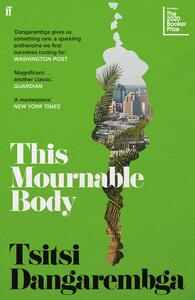You need to sign in or sign up before continuing.
Take a photo of a barcode or cover
dark
emotional
reflective
medium-paced
Plot or Character Driven:
Character
Strong character development:
Complicated
Loveable characters:
Complicated
Diverse cast of characters:
Yes
Flaws of characters a main focus:
Yes
I flew through the first 100 pages of this book, which then made me think that I was going to fly through the rest of the book. Honestly there is no doubt about it that Dangarembga is a terrific writer, I don’t think I’ve ever seen someone write in the second-person so effectively. The thing with this novel is that it’s entirely character driven without much of a plot at all, and I’ll add that my rating comes with a caveat that in many ways I just don’t think it was the right time for me to read something so...slow.
What worked:
-The second-person narration was a lot of fun in this book. I don’t think I’ve ever seen it done this well.
-The main character is unlikable as they come. From wanting to seduce a woman’s sons to so she could get in on the inheritance to being petty towards students.
-Some of the ideas (mainly feminist ones) were really well done.
What didn’t work:
-The story is broken up into parts. I really enjoyed the first half and the back half more than the middle.
-Secondary characters weren’t very fleshed out. This is very much a character study, so it’s hard to strike against the author when this was very much so what she wanted to do.
What worked:
-The second-person narration was a lot of fun in this book. I don’t think I’ve ever seen it done this well.
-The main character is unlikable as they come. From wanting to seduce a woman’s sons to so she could get in on the inheritance to being petty towards students.
-Some of the ideas (mainly feminist ones) were really well done.
What didn’t work:
-The story is broken up into parts. I really enjoyed the first half and the back half more than the middle.
-Secondary characters weren’t very fleshed out. This is very much a character study, so it’s hard to strike against the author when this was very much so what she wanted to do.
Second person narration and a faster pace make this the strongest book of the trilogy, but still a long, slow walk from beginning to end.
Will come back to it; just didn’t realize it was in a series and I’d like to understand the protagonist’s past better.
medium-paced
Plot or Character Driven:
Character
Strong character development:
No
Loveable characters:
No
Diverse cast of characters:
Yes
Flaws of characters a main focus:
Yes
dark
slow-paced
Plot or Character Driven:
Character
Strong character development:
No
Loveable characters:
No
I can't stop thinking about this trilogy and all that it depicts, wondering how to even write about it.
On the surface it's the story of Tambu, a girl from a Zimbabwean village, her coming of age and entry into adulthood and how all of that is affected by her encounters with the outside world, firstly through her cousin and Uncle who went to England, who on their return possessed something Tambu wished to aspire to, and knew she could only get through a certain type of education - and underneath it's about the mutation of an individual and a society.
That is the beginning of her losing something of herself, in the same way that every country that was ever colonised began a similar descent when their colonisers arrived.
Tambu is diligent and focused, on becoming something that "others" approve of and pursues it relentlessly.
In This Mournable Body, she is at a low point, she has left a job at an ad agency on a principle, one she has never uttered, nor been supported in, wrongs happen in silence, rights are not up for discussion.
She moves to the widow's home and ponders another route while helping herself to the vegetable garden, she imagines seducing one of the sons, though never acts on it. Homemaking isn't one of her aspirations. She returns to teaching, we know intimately of her experience as a pupil, what she encounters are wholly different children, the "born-frees".
Tambu has always adapted to fit in and tried to excel to overcome obstacles, in the classroom signs of mental unease appear, she reaches breaking point. And tips over.
Returning to her cousins home, she is further disillusioned, unwilling to accept her reality, her aspirations still carry foreign expectations.
It's a life of pursuit and escape as each new venture brushes up against values and principles she doesn't think or speak of, that force her to act when she realises she is compromising who she is. Denial battles with mental stability.
When the ants appear it's time to pay attention.
In a recent interview NPR's Sacha Pfeiffer asked about the message Tsitsi Dangarembga is giving to young Zimbabweans, given the despair of her anti-hero Tambu, in a week where the author was shortlisted for the Booker Prize and arrested for a peaceful protest against government corruption:
"What happens is up to us because Tambudzai - all she's concerned with is getting ahead in her own life. I show that that kind of attitude may lead to a person getting what they want for some time. But in the end, the repercussions of that kind of behaviour are going to be felt by everybody...because since the economy is so difficult, people think, I just have to put my head down and do what's best for me. But that doesn't solve the community - and - national - level issues that we have to engage with."
Highly Recommended.
My complete review, including extracts from the live London Review Bookshop, interview of Tsitsi Dangarembga by [a:Sara Collins|18453691|Sara Collins|https://s.gr-assets.com/assets/nophoto/user/u_50x66-632230dc9882b4352d753eedf9396530.png] here at Word by Word.
On the surface it's the story of Tambu, a girl from a Zimbabwean village, her coming of age and entry into adulthood and how all of that is affected by her encounters with the outside world, firstly through her cousin and Uncle who went to England, who on their return possessed something Tambu wished to aspire to, and knew she could only get through a certain type of education - and underneath it's about the mutation of an individual and a society.
That is the beginning of her losing something of herself, in the same way that every country that was ever colonised began a similar descent when their colonisers arrived.
Tambu is diligent and focused, on becoming something that "others" approve of and pursues it relentlessly.
In This Mournable Body, she is at a low point, she has left a job at an ad agency on a principle, one she has never uttered, nor been supported in, wrongs happen in silence, rights are not up for discussion.
She moves to the widow's home and ponders another route while helping herself to the vegetable garden, she imagines seducing one of the sons, though never acts on it. Homemaking isn't one of her aspirations. She returns to teaching, we know intimately of her experience as a pupil, what she encounters are wholly different children, the "born-frees".
Tambu has always adapted to fit in and tried to excel to overcome obstacles, in the classroom signs of mental unease appear, she reaches breaking point. And tips over.
Returning to her cousins home, she is further disillusioned, unwilling to accept her reality, her aspirations still carry foreign expectations.
It's a life of pursuit and escape as each new venture brushes up against values and principles she doesn't think or speak of, that force her to act when she realises she is compromising who she is. Denial battles with mental stability.
When the ants appear it's time to pay attention.
In a recent interview NPR's Sacha Pfeiffer asked about the message Tsitsi Dangarembga is giving to young Zimbabweans, given the despair of her anti-hero Tambu, in a week where the author was shortlisted for the Booker Prize and arrested for a peaceful protest against government corruption:
"What happens is up to us because Tambudzai - all she's concerned with is getting ahead in her own life. I show that that kind of attitude may lead to a person getting what they want for some time. But in the end, the repercussions of that kind of behaviour are going to be felt by everybody...because since the economy is so difficult, people think, I just have to put my head down and do what's best for me. But that doesn't solve the community - and - national - level issues that we have to engage with."
Highly Recommended.
My complete review, including extracts from the live London Review Bookshop, interview of Tsitsi Dangarembga by [a:Sara Collins|18453691|Sara Collins|https://s.gr-assets.com/assets/nophoto/user/u_50x66-632230dc9882b4352d753eedf9396530.png] here at Word by Word.
challenging
emotional
reflective
slow-paced
Plot or Character Driven:
Character
Strong character development:
Yes
Loveable characters:
Complicated
Diverse cast of characters:
Yes
Flaws of characters a main focus:
Yes
3.5-⭐️: There are aspects of this book which are quite enjoyable, but this book depressed me at times. Tambudzia isn’t the most likable character, which I can usually bypass, but I genuinely couldn’t understand her logic. The book is set in second person, so... she = me.
I know this is the third part of a trilogy, and I wish that I had read the first two parts before reading this even though Booker Prize doesn't nominate books based on the entire series but on a standalone basis.
I appreciate how much I got to know about Zimbabwe, a country which I knew virtually nothing about. The effects of colonialism and how they can be long-lasting are explored thoroughly in this book. If you get a convent education in a school with white children, you actually should be able to get the same opportunities in the world as them, right? Our protagonist Tambu struggles with this exact predicament. In addition to that, being a woman comes with a different set of weight on your shoulders, with people being wary of a single woman of her 'advanced' age. Struggling with her career also leads to major mental health issues.
This book is an excellent insight into the mind of a woman who has been striving to get out of the life she is in. She makes many mistakes, engaging in self-destructive behaviour leading to mental breakdowns. Sometimes you want to shake her just because of her thought process, like when she thinks that the only way out of her miserable life is to get married to her landlord's son. Sometimes you just want to make her realise that she is enough.
I will read the first two parts of this book and then reread this book, because I think I missed some particular nuances that I wish to explore more.
I appreciate how much I got to know about Zimbabwe, a country which I knew virtually nothing about. The effects of colonialism and how they can be long-lasting are explored thoroughly in this book. If you get a convent education in a school with white children, you actually should be able to get the same opportunities in the world as them, right? Our protagonist Tambu struggles with this exact predicament. In addition to that, being a woman comes with a different set of weight on your shoulders, with people being wary of a single woman of her 'advanced' age. Struggling with her career also leads to major mental health issues.
This book is an excellent insight into the mind of a woman who has been striving to get out of the life she is in. She makes many mistakes, engaging in self-destructive behaviour leading to mental breakdowns. Sometimes you want to shake her just because of her thought process, like when she thinks that the only way out of her miserable life is to get married to her landlord's son. Sometimes you just want to make her realise that she is enough.
I will read the first two parts of this book and then reread this book, because I think I missed some particular nuances that I wish to explore more.




